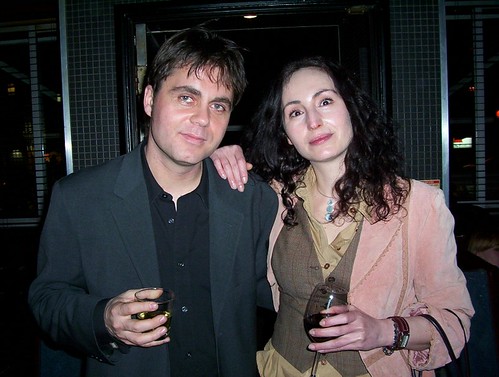The QWERTY universe
The Paddock was jammed full of writers and academics last Friday night, there to celebrate Darren Wershler-Henry's successful defence of his doctoral dissertation. Darren's dissertation is about the typewriter and its effect on the development of literature, and in the fall McClelland & Stewart will publish it as The Iron Whim: A Fragmented History of Typewriting. I'm looking forward to it; I'm told there's a good 50 manuscript pages in there on the whole infinite-number-of-monkeys thing.
The defence had happened Friday morning, and the question everyone at the party was talking about had been lobbed by Marcus Boon: "There are some technologies that may be described as cosmological. Is the typewriter one of them?" Apparently Darren thought about this for a bit & declared that it is not, which came as a surprise to Marcus. It is an interesting question, and I'd tend to side with Marcus, I think. The thing is that people seemed to agree that the computer is a good example of a cosmological technology, but I think that any cosmological edge that the computer appears to have over the typewriter is illusory. Partly the illusion is simply a function of the fact that a computer is opaque, while a typewriter is transparent; the guts of a typewriter are on display & we can see just how it works, while the processing that happens inside a computer is invisible and the way it works is mysterious to most of us: just like the universe! QED! On a more complex level, the question had me thinking back to issues that came up in the neurophenomenology course I took with Evan Thompson last term. Thompson was a collaborator of the late Francisco Varela, who was one of the originators and proponents of the notion of autopoiesis. We can think about the universe as an autopoietic system, as it's clearly self-sustaining and self-perpetuating (although it's an imperfect analogy, as autopoesis involves being situated in and interacting with an environment). The typewriter, however, is obviously an allopoietic system: it is not autonomous and it generates things, texts, which are distinct from itself. We sometimes think of computers as having an autopoietic autonomy, but they really don't. A related idea is that we have a tendency to think of computers as being able to represent things (ie images) to themselves, when in fact they can only represent images to us. This comes up in the debate over mental imagery, because some theorists point to the way computers store and represent visual images as a model that explains how the human mind does it, but the problem (in a nutshell) is that the computer isn't interpreting the image in any meaningful way, just storing it & forking it back over to the human user, so questions about how we visualize wind up back where they started, in the human brain. So, while it's true that a typewriter neither sustains nor understands itself, neither does a computer. They're both and equally cosmological only in a metaphorical sense. I mean, pretty much anything that is not actually the universe is cosmological only in a metaphorical sense, but between the universe and, say, an organism, you could draw some fairly extended analogies; here the metaphor is more strictly poetic.
I have a lot of hilariously embarrassing photos of what Darren looked like after half the Canadian indie literary community had bought him shots of scotch, and I e-mailed them to all his friends the next day, because I am a bad person, but for this post I'm using what I think is a very nice picture indeed of him posing with Helen Tsiriotakis. Congratulations, Darren!



0 Comments:
Post a Comment
<< Home